|
|
|
Sort Order |
|
|
|
Items / Page
|
|
|
|
|
|
|
| Srl | Item |
| 1 |
ID:
170765
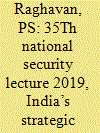

|
|
|
|
|
| Summary/Abstract |
We live in a world in which a post-cold war order is still in the making, as the sole super power shares the global stage with multiple state actors of varying weights, jostling for space to assert their national aspirations.
In this complex environment, India’s foreign policy seeks to maximise India’s political and economic space to further its global ambitions. This includes sustaining the vibrant India-US strategic partnership, forged since the early 2000’s, even while preserving the traditionally strong relationship with Russia from the decades of the Cold War. A comprehensive partnership has also been developed with China, though recent differences have somewhat dimmed its intensity. India needs a combination of domestic capacity building and external partnerships to reconcile the contradictory pulls of strategic cooperation and competition with China. Relations with the US, Russia, Japan and Europe are also elements of this effort. India’s multilateral activism in G-20, BRICS and SCO serve to enhance its room for manoeuvre in the dynamics of the US, Russia, China triangle. India’s strategy in the India-Pacific seeks to promote bilateral, plurilateral and multilateral partnerships in search for a cooperative and sustainable architecture in the region that promotes objective of a multi-polar order.
|
|
|
|
|
|
|
|
|
|
|
|
|
|
|
|
| 2 |
ID:
171732
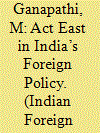

|
|
|
|
|
| Summary/Abstract |
We live today in an interdependent world. The concept of the ‘Global Village’
is a part of India’s culture, and we see ‘Vasudeiva Kutumbhakam’ as a part of
our ethos. A country’s foreign policy contributes immensely towards its
progress and prosperity in a globalising village. This reinforces the idea that
the foreign policy of any country cannot be divorced from its domestic policy
and governance - the influence and outcome of each impact with equal measure
on the other
|
|
|
|
|
|
|
|
|
|
|
|
|
|
|
|
| 3 |
ID:
193415
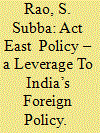

|
|
|
| 4 |
ID:
185129


|
|
|
|
|
| Summary/Abstract |
The Modi government has shown that it can “look beyond dogma,” whether it is through a willingness to use force in Pakistan; to build stronger relations with the Middle East; to capture Trump’s imagination; to recognize Europe’s importance in times of changing geopolitics; to embrace the fact that technology is central to international relations; or to rewire India’s position within Asia.
|
|
|
|
|
|
|
|
|
|
|
|
|
|
|
|
| 5 |
ID:
155180


|
|
|
|
|
| Summary/Abstract |
The first decade of the twenty-first century saw the chants of the rise of an Indian superpower. These claims of the twenty-first century as India’s century were not only based on the massive economic growth that the country saw in the post-1991 liberalisation period, and the concomitant boost in military infrastructure, but also by virtue of its having the biggest functional democracy, an influential multi-million plus diaspora, the sway of Bollywood in the region and abroad and the spectacular religious-linguistic diversity of the country. From conducting mega disaster-relief operations during the 2004 tsunami to effectuating the world’s largest civil evacuation during Operation Rahat, India has ceaselessly augmented its soft power potential to project its national power in the region. This article is an attempt to analyse the possibilities and challenges that India faces in the effective functioning of its soft power in the region. It also remarks as to how India’s soft power limitations can be quashed by integrating a smart power approach in its foreign policy by strengthening existent digital and public diplomacy infrastructure.
|
|
|
|
|
|
|
|
|
|
|
|
|
|
|
|
| 6 |
ID:
144000
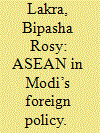

|
|
|
|
|
| Summary/Abstract |
Popular history on India’s foreign policy exaggerates socio-politico and cultural ties of East Asian nations to that of India. It is true to a great extent where religion spread throughout South and East Asia along the trading routes. Indonesia, Malaysia and Thailand embraced Hinduism, while Buddhism flourished in Japan, Vietnam, Korea and China and other countries such as Burma, Cambodia and Thailand too.
|
|
|
|
|
|
|
|
|
|
|
|
|
|
|
|
| 7 |
ID:
162980
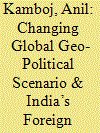

|
|
|
|
|
| Summary/Abstract |
With the fast changing geo-political situation of the world, thanks to United States President Donald Trump, it is becoming very important to keep abreast with the latest updates. He has changed the world order and is acting like a big policeman or if I am allowed to say, I would call him a ‘Big Bully’. It is not even sure that by the time one reads this Article the situation may have again changed. US President Donald Trump has been challenging almost all the traditional assumptions about America’s international relations.
|
|
|
|
|
|
|
|
|
|
|
|
|
|
|
|
| 8 |
ID:
152926


|
|
|
| 9 |
ID:
177776
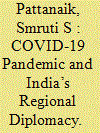

|
|
|
|
|
| Summary/Abstract |
The COVID-19 pandemic placed enormous stress on the fledgling health infrastructure in the South Asian region. The economic distress compounded the problem as many business houses closed down and people working in the informal sector lost their jobs. The governments in the region, except in Pakistan, went for a complete lockdown to contain the spread of the pandemic. India which prides itself as the ‘Pharmacy of the world’ geared up to provide humanitarian assistance by supplying essential medicines, ventilators and providing rapid-action teams consisting of medical professionals to assist its neighbours as a first responder. It also supplied vaccines to the immediate neighbourhood once they were ready. India’s health diplomacy enhanced its soft-power projection and helped it project itself as a country that is concerned about its neighbours—a major shift in its regional diplomacy, compared to the Cold War period. This article maps India’s regional diplomacy in the historical context and analyses the making of India’s regional diplomacy in the context of COVID-19 pandemic.
|
|
|
|
|
|
|
|
|
|
|
|
|
|
|
|
| 10 |
ID:
157323
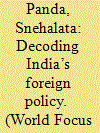

|
|
|
|
|
| Summary/Abstract |
With diligent management of diplomatic, economic and military resources India has gained respectable status in the international sphere .Even so major determinants of its foreign policy remain unchanged amid continued tension in the neighbourhood though strategic relationship with some big powers has been fast forwarded and soft power diplomacy is by and large successful. It has to fine tune its relation with Pakistan and settle territorial disputes with neighbours. Close rapport with world decision makers is essential.India must also consider its military option which would enhance its deterrence to deal with provocations from neighbours.
|
|
|
|
|
|
|
|
|
|
|
|
|
|
|
|
| 11 |
ID:
162991


|
|
|
|
|
| Summary/Abstract |
In International power politics, the big question is aroused, in regard to how India will respond to the recent democratic triumph in India’s neighborhood especially in Pakistan and Maldives. Whether the answer is simply confined to customary routine practice and ritualistic gestures of congratulating and respecting the formality or much more? In this above backdrop, this paper has two objectives. First, it examines the latest development taking shape in Pakistan particularly after the victory of Imran Khan as a Prime Minister of Pakistan and what expectation has been made from India and how India responds to improve India-Pakistan relations. Second, it analyses Maldives recently concluded Presidential election and victory of Mr. Solih (a democratic candidate) and how India will respond to these development.
|
|
|
|
|
|
|
|
|
|
|
|
|
|
|
|
| 12 |
ID:
155734


|
|
|
|
|
| Summary/Abstract |
A power transformation appears to be taking place in Asia, brought about by the rapid emergence of China and the relative decline of US influence. India has sought a way to cope with this new situation. India itself has been rising to prominence since the 1990s, particularly its nuclear weapon tests in 1998 onward. Since the start of the twenty-first century, India has been perceived as the next country to follow China in seeking a major power status. Although India has previously tended to conceal its power aspirations, in 2015 it declared its intention to be a leading power. This article elucidates this transformation through India's policy orientation on a local, regional, and global level and its key partnerships with Russia and Japan. India’s metamorphosis holds great implications for the transformation of power in Asia.
|
|
|
|
|
|
|
|
|
|
|
|
|
|
|
|
| 13 |
ID:
170895


|
|
|
|
|
| Summary/Abstract |
This article explores new lines of conceptualization to understand India’s regional behavior. It argues that the twin concepts of relational power and domestic balance of forces provide better insights into India’s post-Cold war responses than some of the available explanations. It allows us to connect the domestic and external dimensions of policy and identify the cluster of state and non-state actors that shape policy responses. Imagining India’s regional behavior in relational terms allows us to better explain the gap between power and policies, what current literature has identified as the key puzzle in India’s foreign policy behavior.
|
|
|
|
|
|
|
|
|
|
|
|
|
|
|
|
| 14 |
ID:
148493


|
|
|
|
|
| Summary/Abstract |
This article, set in the tradition of analysing the domestic inputs to foreign policy, explores the interface of federalism and the making and execution of foreign policy in India by looking at six case studies drawn from the United Progressive Alliance UPA (2004–2014) and the National Democratic Alliance NDA-II (2014 onwards) periods. Although the Indian Constitution has vested the power to conduct foreign policy almost exclusively in the Union government, serious differences between the two layers of government in the Indian federation have never been unknown altogether. However, it is argued here that the twin developments of the 1990s, that is, rise of coalition governments at the central level and introduction of neoliberal reforms in the Indian economy, enabled States to deepen their footprints in the foreign policy arena. In conclusion, the article attempts a comparison of the two regimes’ performances in handling the issues concerned and asserts that instead of depending on ad hoc political management skills, these developments should be addressed through devising some new mechanism to achieve effective consultations between the Centre and the States on the foreign policy front.
|
|
|
|
|
|
|
|
|
|
|
|
|
|
|
|
| 15 |
ID:
165088


|
|
|
|
|
| Summary/Abstract |
India’s government under Narendra Modi represents a return to single party rule. This paper investigates whether and why single party governments in India differ in their extremity of foreign policies from coalition governments. It particularly focuses on how different forms of government influence the saliency, contestation, and enactment of national conceptions about India’s global role. First, I situate India within the academic debate regarding coalitional governments and foreign policy. I suggest that one reason why India challenges scholars‘ assumption is the missing link between partisan conceptions of India’s global role and their institutional representation. Second, I propose a role theoretical approach and argue that the process of self-identification, consisting of ego and anticipated alter expectations, conditions a state’s role set and extreme foreign policy. It is hypothesized that the nature of contestation of national role conceptions varies between factions and fractions because of the nature of India’s party system, as well as the relative significance of external others for India’s identity. Third, I examine instances of role-taking in the field of nuclearization and Sino-Indian relations. Findings suggest that contested role conceptions during single-party rule caused more extreme variances in international role-taking, while coalition governments proved to induce more complementary role-taking processes.
|
|
|
|
|
|
|
|
|
|
|
|
|
|
|
|
| 16 |
ID:
169819
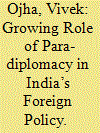

|
|
|
|
|
| Summary/Abstract |
The notion of Para-diplomacy in india can be best understood through the innovative concept of Competitive Federalism. Indian Prime minister Narendra Modi once visited liberty foundation in America where he came to know the concept of competitive federalism. Immediately thereafter he discussed this concept with Niti Aayog. Niti Aayog felt the mesmerizing potential of this concept in context to indian federalism sometimes seen vulnerable due to states adamant behaviour towards central government. Niti Aayog, PMO and other concerned entities under prime minister Modi thought that a policy of engagement of Indian states in various sectors in a competitive manner could be formulated to harness development syndrome in the country .
|
|
|
|
|
|
|
|
|
|
|
|
|
|
|
|
| 17 |
ID:
170902
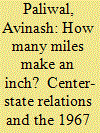

|
|
|
|
|
| Summary/Abstract |
Unabated protests in Manipur against India’s boundary with Myanmar and the lack of demarcation of some boundary pillars, despite the signing of the India-Burma Boundary Agreement in 1967, makes it an important case to study how center-state relations impact India’s foreign policy decision-making and implementation processes. Based on fresh archival material, this article explains why New Delhi refused to consult state governments in Northeast India before signing the boundary agreement, and the limiting consequences of such a top-down decision-making approach during the demarcation phase. A postcolonial entity that struggled to generate legitimacy in and assert sovereign control over the Northeast, India’s approach on this issue offers an opportunity to reflect upon the (limited) conceptualization of, and ongoing debates around, the idea of a ’state’ within foreign policy analysis.
|
|
|
|
|
|
|
|
|
|
|
|
|
|
|
|
| 18 |
ID:
145891
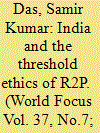

|
|
|
|
|
| Summary/Abstract |
India’s foreign policy in the post-Cold War period has become a subject of one of the most acrimonious debates in her recent past history. While it is often denigrated as ‘firefighting’, ‘ad hocism’ and ‘drift’, many other commentators propose to interpret it as one driven by realpolitik interests paying scant regard to her ideological and ethical commitments. Never before in her history has Indian foreign policy faced such an ethical crisis as it is facing now.
|
|
|
|
|
|
|
|
|
|
|
|
|
|
|
|
| 19 |
ID:
148103
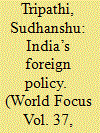

|
|
|
|
|
| Summary/Abstract |
In fact, several recent developments in the upcoming international scenario have ushered into important changes in India’s foreign policy structure under PM Modi which have led to forge New Delhi’s closer relations with US, Australia, Japan and other major western powers. Evidently, that manifests a more pragmatic interest-oriented foreign policy of the country with a view to make India a self-sustaining economic power with sociopolitical stability and potentially sound security structure. Although it has prompted to pursue proAmerican stand on all intenational issues in the recent past, yet this shift in Indian foreign policy has not yet materialised into the US fulfilling India’s long pending demand to force Pakistan to stop exporting cross-border terrorism into the country and restraining China’s anti-Indian activities with likely formation of BeijingIslamabad unholy axis against New Delhi, besides securing a permanent seat for India in the UN Security Council.
|
|
|
|
|
|
|
|
|
|
|
|
|
|
|
|
| 20 |
ID:
148107
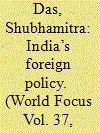

|
|
|
|
|
| Summary/Abstract |
India’s foreign policy in the 21st Century is appraised due to the interplay of geoeconomics with geopolitics and India’s search for a visible and a constructive role on the global map, the need for sustainable economic growth, energy security, food security and border disputes on the one hand and the United States’ Pivoting Asia and expecting India to take the lead role on the Indian Ocean. Therefore the core policy paradigm Nonaligned Movement (NAM) has come into strict scrutiny. The paper will deal with Non-aligned Movement from three angles a) NAM being the central factor in India’s foreign policy making, b) India’s role in NAM, c) NAM and Indo-US relation.
|
|
|
|
|
|
|
|
|
|
|
|
|
|
|
|
|
|
|
|
|